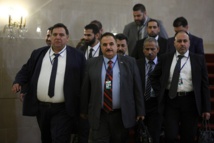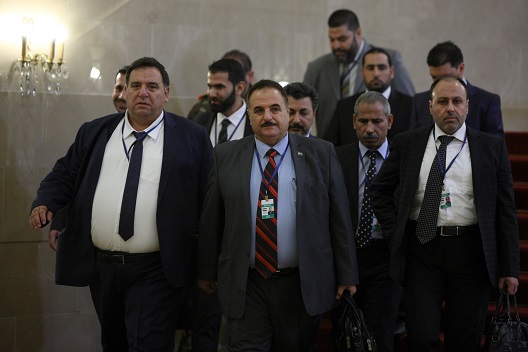
Photo: Ahmed Beri (C), chief of staff of the Free Syrian Army, attends the round of Syria peace talks in Astana, Kazakhstan September 15, 2017. REUTERS/Mukhtar Kholdorbekov
This intervention gave the regime several victories over the opposition in different parts of Syria, and the most important was the seizure of Aleppo. Meanwhile, Jabhat al-Nusra continued to attack the Free Syrian Army (FSA) factions, setting off a long spiral of infighting that has exhausted opposition efforts, and hindered FSA factions from uniting under one army.
These and other regional developments has overshadowed the Syrian conflict. The Qatari-Saudi tensions now called the “Gulf Crisis,” and the United States’ weakening role in the region led to the meeting of countries that have actual influence on both sides and oppose US policy in the region namely Turkey, Iran, and Russia. These countries then proceeded to launch the Astana negotiations in an effort to implement a cease-fire, break sieges, allow aid deliveries, and release detainees in preparation for serious engagement in the Geneva talks.
The Astana track has become a more serious and realistic peace negotiation process than Geneva, which some are describing as no more than academic workshops for throwing around ideas and visions for the future.
De-escalation zone agreements between the countries sponsoring the Astana track are the most important result of the negotiations in this context. Now, in its sixth round, Astana will cast its shadow over all operations in the field to finalize the control map with eighteen opposition factions in attendance. Meanwhile, the Syrian regime is taking advantage of its ceasefire with the opposition and its many battle fronts with the Islamic State (ISIS, ISIL, Daesh). The Syrian Democratic Forces (SDF) are battling ISIS in Raqqa, as regime troops arrive in Deir Ezzor and control most of the Syrian desert.
The sixth and likely final round of negotiation will focus on Idlib, the main and most sensitive opposition stronghold which is complicated by the presence of the Jabhat al-Nusra. Furthermore, the population in Idlib has dramatically increased due to forced displacements by the regime across Syria.
Syrians are cautiously awaiting the arrival of Turkish troops in Idlib alongside opposition factions to launch a military operation to regain control of the city from Jabhat al-Nusra which has sensed the danger before each round of Astana talks and launched attacks against opposition factions, the last of which targeted Ahrar al-Sham. Furthermore, this Turkish military campaign aims to prevent Kurdish forces in Afrin from entering Idlib under the pretext of combating terrorism, thereby creating new Kurdish-Arab tensions similar to what has taken place in Raqqa which increases the Kurdish threat to Turkey through control of the north-west border line to the Mediterranean sea.
But what the Syrian people, political, and military leadership do not know, is how far Turkish forces will push into Syria, or more clearly, what the limits of Turkish intervention actually are. It could range from control over all liberated areas in Idlib and the surrounding countryside in Aleppo, Hama, and Latakia, to entry into certain areas with limited agreements by Russia and Iran. In the latter case, Russia and Iran would take their share of this region, or even hand over the whole of Idlib to Turkey while Russia and Iran take other regions of their own. Some claim the most likely scenario will see Iran take the area south of Damascus (Yalda, Babbila, Beit Sahm, and Yarmouk) and transfer the residents of the towns of Fuaa and Kefraya in Idlib to this region. This will provide Iran with a loyal population in Damascus and increase its chances of controlling and influencing political decisions in Damascus, especially since Iran’s focus has been on establishing a land bridge with Iraq, securing the perimeter of the capital, and its economic and political infiltration of Damascus, in addition to control over decision makers in the government and military and security apparatus.
In light of opposition failures to halt regime expansion, as was the case in Aleppo and the southern Aleppo countryside, and its inability to withstand the Regime’s scorched earth policy, Turkey believes that by pursuing rapprochement with Russia and Iran, it has stopped them from expanding towards Idlib.
Turkey has also worked to weaken Jabhat al-Nusra by breaking up the alliances that existed between certain factions and Nusra, as it did when it pushed Ahrar al-Sham to confront Jabhat al-Nusra and expand into recently liberated areas. This confrontation came about after Turkey was pressed and asked to halt Nusra’s growth and re-open communication channels with Harakat Nur al-Din al-Zenki, which split from Nusra-led Hay’at Tahrir al-Sham (HTS).
Conditions on the ground are right for Turkey to enter Idlib. There are still pockets of opposition in Idlib and the surrounding countryside, namely Harakat Nur al-Din al-Zenki, which controls a geographically and socially cohesive area in the western Aleppo countryside, the Suqour al-Sham brigades, the Free Idlib Army, and Ahrar al-Sham in Jabal al-Zawiya and Jabal al-Wastani in Idlib; Ahrar al-Sham, Jaish al-Nasr, Jaish al-Izza, and Failaq al-Sham spread across Aleppo and Idlib; and the First Coastal Division on the coastal front. These events coincided with the launch of the Syrian Islamic Council, Turkey’s partner in the initiative to form a national army that has the support of more than forty opposition factions. Turkey is also expected to draw on Euphrates Shield forces, a good number of which are Idlib natives who have fought Jabhat al-Nusra since 2014, in this context.
After the latest round of defections, Jabhat al-Nusra has become weak, especially since the defecting factions have known its strengths and weaknesses from when they were part of HTS. The remaining factions plan to return to Idlib and eliminate the Jabhat al-Nusra groups that attacked other opposition groups and caused the deaths of many of their fighters.
Everyone on the ground is waiting for the results of the Astana talks to see how it will affect events in Syria in general and in Idlib in particular. It is possible that events could take a different course in the future and that the interests and policies of international states could shift. There is always the fear that Russia will betray Turkey and move towards another player like the United States after the great gains achieved by Russia’s rapprochement with Turkey, or that Iranian militias will attack opposition areas, as has happened on so many occasions in the past and that we will once again see the return of fighting, especially in light of the fact that there is no balance of power between two of the guarantors. Turkey’s influence in Syria does not compare to that of the Iranians who can access every front in Syria, while Turkish’s presence is limited to specific areas.
Saudi Arabia, which for the time being remains far removed from the Syrian issue and is preoccupied with internal problems and the Qatar crisis, could return to the conflict and provide meaningful support to the opposition, allowing it to fight regime forces. Opposition forces that still strongly believe in the removal of the regime are not satisfied with the deteriorating state of the conflict. The factions that went to Astana begrudgingly are not satisfied by the current situation either. They are angered by the international community’s inaction and abandonment of the Syrian people. While liberated areas are passed around like currency to make deals according to the interests of each state.
----------------------
Atlantic council
Abdullah Almousa is a researcher and military analyst with four years of experience. Currently, he works as a manager for Hooz. He previously worked as a field officer for international organizations in Syria.









 Home
Home Politics
Politics










